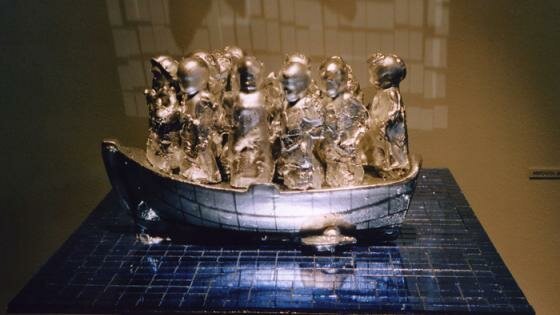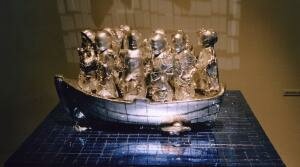An exhibition dedicated to the intimate relationship between the Greek people and the Mediterranean Sea through the ages will be on display at the Centre for Fine Arts, commonly known as Bozar, in Brussels from 24 January to 27 April, 2014. The exhibition Nautilus, Navigating Greece - co-organised by the Greek ministry of Culture and Sports, in collaboration with the Permanent Representation of Greece to the European Union/ Ministry of Foreign Affairs, is the highlight event of a multidisciplinary programme focused on Greece that the Centre has planned to coincide with the Greek presidency of the European Council.
With the sea as a connecting thread, the exhibition is structured around 7 themes – Genesis, Ecologies, Maritime Routes, Odysseys, Hegemony, Ecumene, Faith – bringing to the fore the interplay between nature, culture, identity, adventure, politics, religion and most of all mobility in all its forms - migration, travel, trade etc.
On display will be over 90 ancient artefacts (bronze and marble sculptures, frescoes, coins, vases and ceramic vessels) spanning from the Cycladic (3000 B. C.), Minoan and Mycenaean to the archaic, classical and Hellenistic periods, ending with the Greco-Roman world (200 AD). These artefacts, from 30 Greek museums will co-exist on display with 23 works of contemporary art including photographs, paintings, and video art, in a virtual conversation between antiquity and the modern world.
As curators Maria-Xeny Garezou, Spyros Makkas and Maria Lagogianni - Georgakarakou explain, the exhibition attempts a reading of political, economic, social and cultural developments in which the sea has played a key role for many centuries, even after the end of antiquity in traditional Mediterranean societies. Nowadays, they note, “this role is changing rapidly, as the post-industrial, digital and broader geopolitical environment dictates a reassessment of geographic and spatial data, creating new conditions and cultures. Concepts such as ecology, mobility, communication, adventure, hegemony, but also the diffusion and unification brought about by the sea, run through and link the individual stops along a route that culminates at underlining the metaphysical quality of the sea, as well as the religiosity and spirituality that has imbued our relationship with it.”
A specially designed catalogue that will be released first in Brussels and then in Athens accompanies the exhibition which will be open to the public as of tomorrow (24.1) until 27 April 2014.









